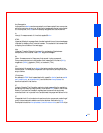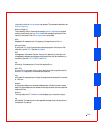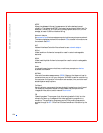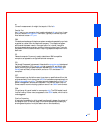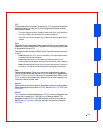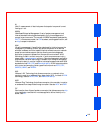
279
PXE
Pre-boot eXecution Environment. A standard of WfM that allows networked
computers that do not have an OS to be configured and started remotely.
PXE benefits include:
• The client computer does not necessarily need its own OS or even a hard drive.
• The client computer can be remotely shut down and restarted.
• Since PXE is an industry standard, new computers can easily be added to the
network.
RAID
Redundant Array of Independent Disks. A system of two or more drives working
together for performance and fault tolerance. RAID drives are typically used
on servers and high-end PCs.
There are a number of different RAID levels. The three most common are 0,
3, and 5:
• Level 0: Provides data striping but no redundancy. This improves performance
but does not provide fault tolerance.
• Level 3: Same as Level 0, but also reserves one dedicated drive for error
correction data, providing good performance and some level of fault tolerance.
• Level 5: Provides data striping at the byte level and also stripe error correction
information. This results in excellent performance and good fault tolerance.
RAM
Random-access memory. The primary temporary storage area for program
instructions and data. RAM is stored in chips on small circuit boards called
SIMMs, DIMMs, or RIMMs, that attach to the system board. RAM, unlike
ROM, is volatile, which means that, when you turn off your computer, any
information stored in RAM is lost.
Rambus
Rambus is a memory technology that is designed to work with existing system
board standards as an alternative to DRAM. See also RIMM, RDRAM, and
DRDRAM.
RDRAM
Rambus dynamic random-access memory (DRAM). A memory subsystem that
can optimally transfer up to 1.6 billion bytes of data per second. The
subsystem consists of RAM, the RAM controller, and the bus connecting
RAM to the microprocessor and other devices in the computer. See also
DRDRAM.



